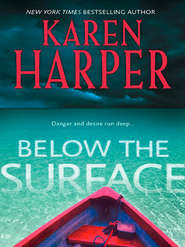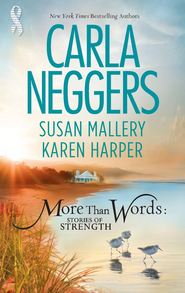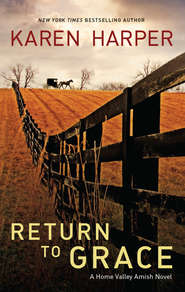По всем вопросам обращайтесь на: info@litportal.ru
(©) 2003-2024.
✖
Fall From Pride
Автор
Год написания книги
2019
Настройки чтения
Размер шрифта
Высота строк
Поля
Sarah knew better than to feel prideful or important, but her people parted for the three of them like Moses at the Red Sea as they walked toward the big, black truck. “We call her VERA for Vehicle for Emergency Response and Arson,” Nate explained, patting the shiny hood as Sarah might her buggy horse, Sally.
“Arson,” Sarah repeated. “Then you do think someone set the barn on fire?”
“Yet to be determined. Arson’s the easiest crime to commit but often the hardest to prove. I know this barn—all your barns—are important to your way of life. If we can eliminate accident and act of nature, arson’s what’s left, and then I’ll investigate that.”
Nate wasn’t sure if the Amish woman and her father were awed or frightened by VERA, but they climbed in the big front seat with him, Sarah between the two men. He was surprised they didn’t fumble with their seat belts but clicked them quickly in place. She wore no wedding ring, but then he hadn’t seen one piece of jewelry on any of these people.
Amazing that, with her honey-colored hair parted in the middle and pulled straight back under her messed-up small cap and with her old-fashioned dirty apron and dress—a peach-colored one, not black—with not a bit of makeup on her face, Sarah Kauffman was a real looker. She was a natural beauty with auburn, perfectly arched eyebrows over heavily lashed amber eyes that seemed to have little flecks of gold swimming in them. Surprisingly, mixed with the scent of smoke, she smelled faintly of lavender. Her full mouth pouted as she looked wide-eyed at the dashboard computer screen.
“Why, it has a map of our area on it,” she said.
“It’s called a global positioner, and it talks to me in a nice female voice if I want it to,” Nate said as he backed up, careful that none of the crowd, especially the gawking boys, were behind him.
“Oh, now it’s changed to a kind of TV screen that shows what’s in the rear when you back up,” she said. Her voice was mellow without a trace of the accent that the older men seemed to have.
“Sarah, Mr. MacKenzie knows what’s in his truck,” her father said.
“Oh, right.”
“So could you tell me what you were doing when you first saw the fire?” Nate asked as he drove them out of the dirt lane to the road.
“My family was hosting a barn dance for my brother’s buddy group,” she explained. “Gabe is seventeen and during the mid to late teenage years, our young people are given a time of freedom called rumspringa, kind of a running-around time before they decide—or not—to join the church. I went outside to ask someone to leave and looked up above his car and—”
“His car?” Nate said.
“Right. Jacob Yoder’s. He shouldn’t have been there, and he was drunk, I think, and making noise, and I was going to ask him to leave.”
Her father put in, “Jacob Yoder has been shunned for breaking the ordnung, Mr. MacKenzie. Lied to the bishop and aided an illegal theft ring of stolen cars, and was unrepentent.”
“So he and Bishop Esh have a history—not a good one?” Nate wanted to ask more about shunning and breaking the ordnung, but he let it go for now. Mark was right about this being a foreign world, one he was going to have to navigate his way through. Find an interpreter of their ways, their culture, Mark had advised. He supposed he should rely on the bishop whose barn had burned, but sitting next to this interested, interesting young woman, he had a better idea. He needed a translator all right, because, despite all of VERA’s space-age charms, he felt like a Star Trekker who was about to go where no man had ever gone before.
When her daad said he’d be out later and went into their house, Sarah was surprised. It was unusual for her father to leave her alone with an outsider, a man at least, so Daad must trust this man. Instead of taking time to change clothes, she decided to get his investigation going right away. She led him toward their barn since he had asked her to show him where she had been when she first noticed the blaze.
“By the way,” she told him, “our barn is almost a replica of the Esh barn, if you want to see how it looked before the fire. Except it’s usually neat as a pin, and we all ran out and left it like this last night.” She gestured inside where a table with food sat and bales of straw surrounded a now-empty circle.
“Yeah, it would help immensely if I could study its structure,” he said, lifting his eyebrows and looking intrigued by something. He had left his mouth wire in his truck. She wondered if he wanted to make her feel more at ease with him, which probably wasn’t going to happen, because he just plain disturbed her somehow.
“Feel free to look around,” she said, noting he at last pulled his gaze away from her to glance high and low inside their barn. “So,” she went on, “I was helping Mamm—my mother—serve food behind that long table there, and I came across this threshing floor—”
“Still used for threshing at harvest time?”
“Sometimes, but we haul modern gasoline threshers now, pulled behind the horses, of course.”
“But animal horsepower pulls them, so they’re not actually fueled by gasoline? That means the hay baler Bishop Esh says he lost in the fire would not have had gasoline in it even off-season?”
“Right—modern equipment but real horsepower.”
“In your field and the Eshes’, I saw them—beautiful horses, big as the Budweiser team. But go ahead. You walked to what spot before you saw the fire. And what did it look like then?”
“I honestly don’t know what time it was, if you need to know that—”
“I have the exact moment the call came in, so that will help.”
“Anyway, I shouted for someone to call the fire department. Later, Jacob told me he’d called it in on his cell phone.”
“Right. I have that info from the sheriff.”
“When the buzzers alert the volunteers, it takes a while to get to the firehouse and then here,” she said as she led him out of the barn.
“I’ve got all that and will be checking everyone out.”
“Oh, sure, to get their descriptions of the fire, too. So I would say I was right here when I saw the golden glow in the distance, which was growing fast and turning orange. And it seemed to start high, then burn downward.”
“Really? That could be a key clue.” He was taking notes with just a regular ballpoint pen on paper now, nodding, looking across the fields where she pointed.
“I thought at first the fire might be the headlights of Jacob’s fancy car,” she added.
“If he was exiled, why—”
“Shunned.”
“Okay, shunned. Then why was he here?”
“It really doesn’t have anything to do with the fire,” she assured him, hesitant to get into all that about Jacob’s past, especially how it meshed with hers.
“You need to let me decide that, Sarah,” he said, turning to her. “Just in case the cause of the fire is incendiary and criminal, I have the right to investigate anyone who could have caused it, even make an arrest.”
“You’re a policeman, too?” she blurted. Although her people rendered to Caesar what was Caesar’s and got on just fine with Sheriff Freeman, the Amish way was to steer clear of government authorities like the ones who had persecuted—burned to death by the hundreds—her people in Europe centuries ago. Her grossmamm, Miriam, was always reading to her from the Plain People’s heirloom book, the Martyrs Mirror—talk about horrible burnings!
“I’m a law officer under certain conditions,” he said. “So what’s with this Jacob Yoder I’ve heard mentioned more than once? He was shunned by Bishop Esh?”
“By all of the church, really. I—it will take some explaining.”
“Then we’ll do it in a later interview. Go ahead and take me across the field the way you ran last night and tell me how the fire appeared to change as you got closer, how the flames spread.”
Happy to have a topic besides Jacob Yoder, she nodded, looking up into his intense gaze again before walking toward the fringe of the plowed field. In his work clothes, Daad came out of the house, and she told him where they were going. He nodded and headed for the barn past the grossdaadi haus where Sarah stayed at night with her grandmother and where poor Martha had been stuck during all the excitement.
“Wait a sec,” Nate said so loudly she jumped. “Your barn doesn’t have lightning rods. The Esh barn didn’t, either?”
“Lightning rods show dependence on man, not God. If the Lord wants to protect a barn, He will.”
“Then, ultimately, if the fire was arson, God’s to blame?” Nate challenged, frowning.
“Not to blame,” she insisted, but she’d never thought of it that way. She supposed there were other sides to some of the things she’d been taught since birth. “We live in an evil world,” she went on, her voice more strident. “The Lord might allow it for a lesson, for our better good, to teach humility or bring our people closer—all positive things, gifts from above. We will work together to rebuild, to raise money for that if we must.”
“So I heard. On the other hand, at least you don’t have electrical wires coming in that could have caused a spark. I didn’t mean to criticize your beliefs, Sarah. I’m just used to lightning rods on barns. Those or smoke alarms or fire extinguishers can save lives and buildings. And maybe God gave the inventors the ideas for those things through inspiration, like positive, useful gifts from above.”
She had to admit that, in his own way, he was right. She must remember, she told herself, that this man was here to help them but that he was not one of them. She had to keep her fences up, however much she wanted to work with him to help the Eshes.











